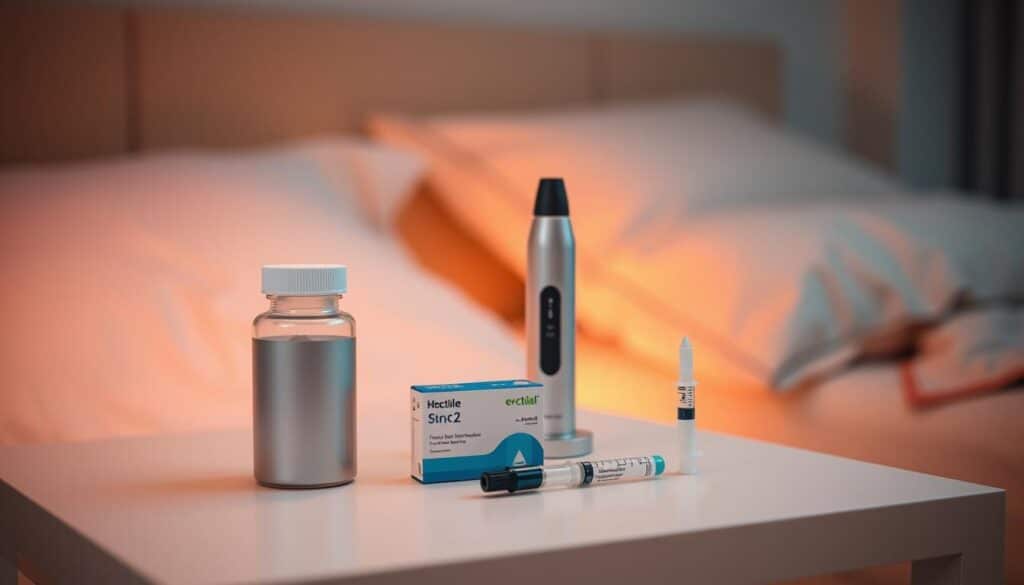Ever felt like your body sends mixed signals? For many, the link between gut issues and sex problems is confusing and tough. Exploring how IBS and erectile dysfunction connect shows how our physical and emotional health are deeply linked, affecting millions.
Many face the silent battle of managing IBS and sex issues. Our bodies are complex systems, and problems in one area can affect others. This journey is about more than just health conditions—it’s about our overall well-being.
IBS and erectile dysfunction are more than just medical issues. They show how our digestive, nervous, and mental health are connected. By looking into this connection, we can find ways to manage these conditions and improve our lives.
Key Takeaways
- IBS and erectile dysfunction often share underlying physiological connections
- Psychological factors play a crucial role in both conditions
- Holistic health approaches can help manage symptoms
- Understanding the gut-brain axis is essential
- Professional medical guidance is crucial for comprehensive treatment
What is Irritable Bowel Syndrome (IBS)?
Irritable Bowel Syndrome (IBS) is a complex condition that affects the large intestine. It impacts millions of people worldwide. It’s a chronic condition with unpredictable symptoms.
IBS is not the same for everyone. People have different symptoms that can affect their daily lives. It’s important to understand IBS to manage its effects.
Key Symptoms of IBS
- Abdominal pain and cramping
- Bloating and gas
- Diarrhea or constipation
- Mucus in stool
- Chronic pain in digestive tract
Potential Causes of IBS
The causes of IBS are complex. Several factors can contribute to it:
- Muscle contractions in intestines
- Nervous system abnormalities
- Severe infection
- Microbiome disruptions
Diagnostic Approach
| Diagnostic Method | Purpose |
|---|---|
| Medical History Review | Understand symptom patterns |
| Physical Examination | Rule out other gastrointestinal disorders |
| Blood Tests | Detect potential underlying conditions |
| Colonoscopy | Evaluate intestinal health |
Diagnosing IBS involves ruling out other conditions. A comprehensive medical evaluation is key. Healthcare professionals provide personalized care for each patient.
“Understanding IBS is the first step towards managing its complex symptoms effectively.”
Understanding Erectile Dysfunction (ED)
Erectile dysfunction affects millions of men worldwide. It’s not just a physical issue. It also affects a man’s mental and emotional health.
Sexual problems can cause big challenges in personal and relationship life. We aim to shed light on this condition and offer important insights.
Common Causes of ED
Many things can lead to erectile dysfunction:
- Cardiovascular diseases
- Diabetes
- Hormonal imbalances
- Neurological disorders
- Pelvic floor disorders
Symptoms of Erectile Dysfunction
Knowing the signs of ED is key for early help:
- Difficulty achieving erection
- Reduced sexual desire
- Inconsistent erectile function
- Premature or delayed ejaculation
When to Seek Help for ED
Autoimmune diseases and other health issues can affect sex life. If you notice any of these signs, see a doctor:
| Symptom Duration | Recommended Action |
|---|---|
| Persistent issues for 3+ months | Schedule medical consultation |
| Accompanied by chronic pain | Immediate medical evaluation |
| Psychological distress | Seek counseling or therapy |
“Understanding erectile dysfunction is the first step toward effective management and improved quality of life.”
We focus on overall health. We encourage talking openly and seeking medical advice for sexual issues.
Exploring the Connection Between IBS and ED
The link between irritable bowel syndrome (IBS) and erectile dysfunction (ED) is complex. It shows how our body systems work together in ways we’re still learning. Chronic pain and stress management play big roles in our overall health.
The Gut-Brain Axis
Our bodies have a network called the gut-brain axis. It shows how our digestive health affects our brain and mood. People with IBS and ED might share similar stress responses due to this connection.
- Neurological connections between digestive and reproductive systems
- Shared neurotransmitter interactions
- Potential inflammatory response mechanisms
Psychological Factors Impacting Both Conditions
Stress affects both IBS and ED a lot. Chronic stress can mess with hormones and nervous system function. It can lead to more health problems.
Anxiety and depression often go with these conditions. This creates a cycle of physical and emotional pain.
“The mind and body are intimately connected, with psychological states profoundly influencing physical health outcomes.” – Dr. Michael Gershon, Neurogastroenterology Researcher
Research Findings on IBS and ED
Recent studies have found interesting links between IBS and ED. They’ve found common risk factors, like:
- Increased sympathetic nervous system activation
- Chronic inflammation markers
- Disrupted hormonal regulation
Knowing these connections helps people find better treatments. Treatments that look at both physical and mental health.
Impact of IBS on Quality of Life
Living with inflammatory bowel disease is tough. It’s not just about physical symptoms. IBS can mess up your daily life, causing emotional and psychological problems.

Emotional and Psychological Effects
Chronic pain from IBS can really affect you emotionally. People often feel:
- More anxious about symptoms
- Embarrassed or isolated
- Depressed because of digestive issues
“IBS isn’t just a physical condition – it’s an emotional journey that requires comprehensive stress management.”
Social Implications of IBS
Dealing with IBS makes social life hard. Work, relationships, and fun activities can be tough when symptoms pop up.
Lifestyle Adjustments
It’s important to find ways to cope. Here are some lifestyle changes:
- Stick to a regular diet
- Find stress management methods that work for you
- Talk openly with your doctor
- Build a strong support network
Understanding IBS’s effects helps you build strength. It can make your life better.
How ED Affects Individuals and Relationships
Sexual dysfunction can deeply affect personal experiences and close relationships. Understanding the emotional side of erectile dysfunction (ED) helps people deal with tough feelings. It also helps them find the right support.
Psychological counseling is key in tackling the emotional hurdles of ED. Men facing sexual issues often struggle with personal and relationship problems.
Impact on Self-Esteem
ED can lead to feelings of not being good enough and lower self-worth. Men might feel:
- Less confident in their relationships
- Stressed about sex
- Bad about themselves
- Want to avoid being intimate
Relationship Strain Due to ED
When sexual issues arise, relationships can get tense. It’s important to manage stress to keep the relationship healthy.
| Relationship Challenge | Potential Emotional Impact |
|---|---|
| Communication breakdown | Increased relationship tension |
| Reduced physical intimacy | Feelings of rejection |
| Misunderstood expectations | Emotional disconnection |
Communication with Partners
Talking openly is the best way to tackle sexual issues. Partners who talk openly can:
- Understand each other better
- Break down emotional walls
- Find solutions together
- Make their relationship stronger
“Vulnerability in communication transforms challenges into opportunities for deeper connection.”
Getting help from a counselor can offer support for both individuals and couples facing sexual problems.
The Role of Stress in IBS and ED

Stress is a big deal for both irritable bowel syndrome (IBS) and erectile dysfunction (ED). It makes things tough for people dealing with these issues. We’ve learned that how we feel mentally affects our body a lot.
Stress as a Common Trigger
Chronic pain and stress can really mess with IBS and ED. Stress makes our body react in ways that mess up normal functions. This creates a cycle of symptoms that’s hard to break:
- Increased cortisol levels
- Heightened nervous system activation
- Disrupted digestive and reproductive system responses
Coping Mechanisms for Stress
Good psychological counseling can really help manage stress symptoms. Here are some effective ways to deal with stress:
- Cognitive behavioral therapy
- Regular exercise
- Professional support groups
“Understanding stress is the first step toward managing its impact on our health.” – Dr. Sarah Thompson, Stress Research Institute
Mindfulness and Relaxation Techniques
Mindfulness practices can help fight off stress symptoms. Meditation, deep breathing exercises, and progressive muscle relaxation are great tools for managing stress.
By tackling the mental side, we can create treatments that help both body and mind.
Medical Treatments for IBS
Managing inflammatory bowel disease needs a detailed plan. We focus on easing symptoms and boosting gut health. Our strategies are designed to meet each patient’s unique needs.
Dietary Adjustments and Nutrition
Diet and lifestyle changes are key in managing gut issues. We create custom nutrition plans. These may include:
- Low FODMAP diet to reduce digestive triggers
- Identifying and eliminating food sensitivities
- Increasing fiber intake through carefully selected sources
- Staying hydrated with appropriate fluid consumption
“Nutrition is the foundation of managing IBS symptoms effectively” – Gastroenterology Experts
Medications for IBS Management
Medicines can help control IBS symptoms. Our suggested medication plans include:
| Medication Type | Primary Function | Potential Benefits |
|---|---|---|
| Antispasmodics | Reduce intestinal cramping | Minimize abdominal pain |
| Antibiotics | Manage bacterial overgrowth | Improve digestive balance |
| Probiotics | Restore gut microbiome | Enhance digestive health |
Alternative Therapies
Complementary methods can support traditional treatments. Possible alternative therapies include:
- Acupuncture for stress reduction
- Cognitive behavioral therapy
- Mindfulness meditation
- Herbal supplements with professional guidance
We ensure patients get care that fits their specific needs. Our approach is all about personalized treatment for IBS symptoms and overall health.
Treatment Options for Erectile Dysfunction
Sexual dysfunction affects millions of men worldwide. It’s a complex issue that needs a full approach. We look at erectile dysfunction (ED) treatments that cover physical and mental health.

Dealing with sexual dysfunction needs a mix of medical help, counseling, and lifestyle changes.
Lifestyle Changes and ED
Changing your diet and lifestyle is key to fighting erectile dysfunction. Important steps include:
- Regular cardiovascular exercise
- Maintaining a healthy body weight
- Reducing alcohol consumption
- Quitting smoking
- Managing stress through relaxation techniques
Medication for ED
Medicines are a big help for many men with sexual problems. Common ones are:
| Medication | Primary Function | Average Effectiveness |
|---|---|---|
| Sildenafil (Viagra) | Enhance blood flow | 70-80% |
| Tadalafil (Cialis) | Improve erectile response | 65-75% |
| Vardenafil (Levitra) | Stimulate sexual function | 60-70% |
Counseling and Therapy for ED
Psychological counseling is a big part of treating sexual issues. It’s because ED often comes from emotional or relationship problems.
“Effective treatment of erectile dysfunction requires addressing both physical and psychological dimensions of sexual health.” – Dr. Michael Thompson, Urologist
Therapy can include:
- Individual psychological counseling
- Couples therapy
- Stress management techniques
- Cognitive behavioral therapy
It’s best to talk to health experts for a treatment plan that fits your needs and history.
Lifestyle Changes to Manage Both Conditions
Managing irritable bowel syndrome (IBS) and erectile dysfunction (ED) needs a big change in diet and lifestyle. We focus on healing the whole person. This includes both physical and mental health.
Stress is a big factor in chronic pain and overall health. We’ll look at lifestyle changes that can help a lot with these health issues.
Importance of a Balanced Diet
Eating right is key for IBS and ED. Our diet plan includes:
- Less processed foods
- More fiber from veggies and fruits
- Drinking plenty of water
- Figuring out and avoiding foods that trigger symptoms
Role of Exercise in Treatment
Exercise is a big help for both IBS and ED. It lowers stress, improves blood flow, and boosts health. We suggest:
- 30 minutes of exercise every day
- Mixing cardio and strength training
- Doing low-impact activities like walking or swimming
Sleep Hygiene’s Effect on IBS and ED
“Quality sleep is the foundation of healing and recovery.” – Wellness Experts
Good sleep is essential for healing. It helps reduce stress and improves symptoms. Key sleep habits include:
- Keeping a regular sleep schedule
- Having a calming bedtime routine
- Limiting screen time before bed
By making these lifestyle changes, people can take control of IBS and ED. This can greatly improve their life and health.
The Importance of Open Communication
Dealing with ibs and erectile dysfunction is more than just medical care. Open talk is key to handling these sensitive health issues well.
Psychological counseling shows how talking openly can change lives. By sharing openly about these health issues, we can lower stress and feel better overall.
Discussing IBS with Partners
When talking about IBS, keep these tips in mind:
- Find a quiet, private spot
- Describe your symptoms clearly
- Tell how it affects your daily life
- Ask for emotional support
“Being open builds understanding and strengthens bonds during health struggles.”
Talking About ED with Healthcare Providers
When talking to doctors, be ready. Make a list of your symptoms, worries, and questions. Doctors are trained to handle these topics with care.
Support Networks for Those Affected
Connecting with others facing similar health issues offers:
- Emotional support
- Useful tips for coping
- Less feeling of being alone
- Shared advice and resources
Our health journey gets easier with open talk and support from others.
Seeking Professional Help Together
Dealing with gastrointestinal disorders and sexual dysfunction is tough. We need expert advice and a full understanding of how these issues connect.
When facing health challenges together, finding the right doctor is key. We should look at the big picture and plan carefully.
When to Consult a Gastroenterologist
It’s important to know when to see a gastroenterologist. If you have:
- Persistent abdominal pain
- Significant changes in bowel habits
- Unexplained weight loss
- Blood in stool
Seeking a Urologist for ED Issues
Sexual problems need a doctor with special skills. A urologist can diagnose and treat erectile issues with detailed plans.
The Role of Integrated Health Care
Psychological counseling is vital for both gut and sexual health. Integrated care offers:
- Comprehensive symptom assessment
- Coordinated treatment strategies
- Holistic patient support
“Effective healthcare is about treating the whole person, not just isolated symptoms.” – Dr. Michael Roberts, Integrative Medicine Specialist
Our health journey is unique. Working with professionals can lead us to better health.
Future Research on IBS and ED
The medical world is diving deep into the link between irritable bowel syndrome (IBS) and erectile dysfunction. They’re finding out how inflammatory bowel disease and autoimmune diseases affect our sex lives.
Current Studies and Trials
Scientists are doing amazing work to figure out how IBS and erectile dysfunction are connected. They’re looking into:
- How our gut health and sex function are linked
- The role of gut bacteria in our reproductive health
- How our minds play a part in both conditions
“Our understanding of the gut-brain connection continues to evolve, revealing complex interactions we never imagined before.” – Dr. Sarah Reynolds, Gastroenterology Research Institute
Areas Needing Further Exploration
There’s still a lot we don’t know about IBS and erectile dysfunction. We need to dig deeper into:
- How long-term inflammation affects our sex lives
- Genetic links between autoimmune diseases and sexual problems
- Ways to treat both conditions at the same time
Potential Developments in Treatment
New research is showing us ways to treat IBS and erectile dysfunction better. We’re talking about:
Targeted microbiome therapies, custom meds, and holistic treatments. These approaches aim to fix both the physical and mental sides of these issues.
We’re excited about the future of research. We hope to find better ways to help people dealing with these tough health problems.
Conclusion: Navigating IBS and ED Together
Living with IBS and erectile dysfunction can feel overwhelming. But, we must remember these conditions don’t define our whole life. By understanding the link between IBS and erectile dysfunction, we can find better ways to manage them.
Stress management is key in tackling both conditions. We need a holistic approach that includes diet and lifestyle changes. These small steps can lead to big improvements in our daily lives, making us feel better.
Importance of a Holistic Approach
Successful treatment goes beyond just treating symptoms. It involves addressing psychological factors, nutritional needs, and personal health patterns. Working with healthcare professionals helps us create plans that fit our unique health needs.
Finding Support in Our Journey
We shouldn’t face these health challenges alone. Support from medical professionals, support groups, or understanding partners is crucial. Sharing our experiences and talking openly helps us manage IBS and erectile dysfunction better.
Hope for Improved Well-Being
New research is uncovering more about these complex health issues. Our dedication to understanding and improving our health gives us hope. With ongoing research and a proactive approach, we can look forward to a better quality of life.

